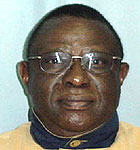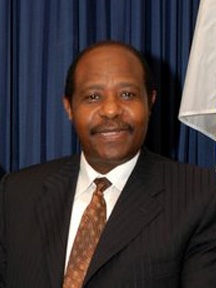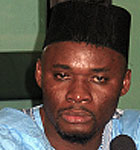Related Research Articles

The International Criminal Tribunal for Rwanda was an international court established in November 1994 by the United Nations Security Council in Resolution 955 in order to adjudicate people charged for the Rwandan genocide and other serious violations of international law in Rwanda, or by Rwandan citizens in nearby states, between 1 January and 31 December 1994. The court eventually convicted 61 individuals and acquitted 14.

Paul Kagame is a Rwandan politician and former military officer who has been the fourth President of Rwanda since 2000. He was previously a commander of the Rwandan Patriotic Front (RPF), a rebel armed force which invaded Rwanda in 1990. The RPF was one of the parties of the conflict during the Rwandan Civil War and the armed force which ended the Rwandan genocide. He was considered Rwanda's de facto leader when he was Vice President and Minister of Defence under President Pasteur Bizimungu from 1994 to 2000 after which the vice-presidential post was abolished.

The Rwandan genocide occurred between 7 April and 15 July 1994 during the Rwandan Civil War. During this period of around 100 days, members of the Tutsi minority ethnic group, as well as some moderate Hutu and Twa, were killed by armed Hutu militias. Although the Constitution of Rwanda states that more than 1 million people perished in the genocide, the real number killed is likely lower. The most widely accepted scholarly estimates are around 500,000 to 800,000 Tutsi deaths.

Théoneste Bagosora was a Rwandan military officer. He was chiefly known for his key role in the 1994 Rwandan genocide for which he was sentenced to life imprisonment by the International Criminal Tribunal for Rwanda (ICTR). In 2011, the sentence was reduced to 35 years' imprisonment on appeal. He was due to be imprisoned until he was 89. According to René Lemarchand, Bagosora was "the chief organizer of the killings". On 25 September 2021, he died in a prison hospital in Mali, where he was being treated for heart issues.

The Rwanda Defence Force is the military of the Republic of Rwanda. The country's armed forces were originally known as the Rwandan Armed Forces (FAR), but following the Rwandan Civil War of 1990–1994 and the Rwandan genocide of 1994 against the Tutsi, the victorious Rwandan Patriotic Front (Inkotanyi) created a new organization and named it the Rwandan Patriotic Army (RPA). Later, it was renamed to its current name.

Paul Rusesabagina is a Rwandan human rights activist. He worked as the manager of the Hôtel des Mille Collines in Kigali, during a period in which it housed 1,268 Hutu and Tutsi refugees fleeing the Interahamwe militia during the Rwandan genocide. None of these refugees were hurt or killed during the attacks.
Georges Henri Yvon Joseph Ruggiu is a Belgian radio presenter who worked for Rwandan radio station Radio Télévision Libre des Mille Collines, which played a significant role in promoting the genocide against the Tutsi. Like the station's other broadcasters, Ruggiu incited violence against Tutsi and moderate Hutu over the air. He had become involved in Rwandan politics just two years before the genocide.

Hassan Ngeze is a Rwandan journalist and convicted war criminal best known for spreading anti-Tutsi propaganda and Hutu superiority through his newspaper, Kangura, which he founded in 1990. Ngeze was a founding member and leadership figure in the Coalition for the Defence of the Republic (CDR), a Rwandan Hutu Power political party that is known for helping to incite the genocide.

Gitarama was one of the former twelve provinces (intara) of Rwanda and was situated in the centre of the country, to the west of the capital Kigali. Gitarama Prefecture was created in 1959, increasing the number of prefectures of Rwanda from eight to nine. In 2002, it was renamed a province, as were the other prefectures of Rwanda. It had an area of 2,187 square kilometres and a population of some 851,451 prior to its dissolution in January 2006. Gitarama was divided into 8 districts: Muhanga, Kayumbu, Kabagali, Ntenyo, Kamonyi, Ntongwe, Ndiza and Ruyumba; and two towns: Ruhango and Gitarama. Gitarama bordered the provinces Butare, Gikongoro, Kibuye, Gisenyi, Ruhengeri, Kigali-Ngali and Kigali City Tourist attractions included the Kamegeri rocks and the Busaga forest.
Athanase Seromba is a Catholic priest from Rwanda who was found guilty of committing genocide and of crimes against humanity during the Rwandan genocide.
Désiré Munyaneza is a Rwandan businessman and convicted war criminal who was living in Toronto, Ontario, Canada, before being imprisoned. He is the first man to be arrested and convicted in Canada on charges of war crimes and crimes against humanity, for his role in the 1994 Rwandan Genocide. He was sent to jail in October 2009.
Félicien Kabuga is a génocidaire and Rwandan businessman who played a major role in the run-up to the Genocide of the Rwandan Tutsis. A multimillionaire, he was closely connected to dictator Juvénal Habyarimana's Hutu nationalist MRND party and the Akazu, an informal group of Hutu extremists who helped lead the Rwandan genocide.
Munyaneza can refer to:

Gikongoro Province was one of the former twelve provinces (intara) of Rwanda and is situated in the southwest of the country. The former province had an area of some 2,146 square kilometers. Its population was estimated at 466,451 (1990) and 511,776 (2002) prior to its dissolution in January 2006, with an annual growth rate of .810% between the years of 1990 and 2002. It included 13 "communes" and 125 sectors.

Louise Mushikiwabo is the fourth and current Secretary General of Organisation internationale de la Francophonie. She previously served as the Minister of Foreign Affairs and Cooperation of Rwanda from 2009 to 2018. She also served as Government Spokesperson. She had previously been Minister of Information.
Rwandan genocide denial is the assertion that the Rwandan genocide did not occur, specifically rejection of the scholarly consensus that Rwandan Tutsis were the victims of genocide between 7 April and 15 July 1994. The perpetrators, a small minority of other Hutu, and a fringe of Western writers dispute that reality.
Jean-Baptiste Habyalimana was a Rwandan academic and politician who served as the Prefect of Butare and was killed during the Rwandan genocide in 1994. He was the only Tutsi prefect at the time of the genocide, and also the only prefect belonging to the Liberal Party. He had resisted the genocide.
The following lists events that happened during 2009 in Rwanda.
François Bazaramba is a Rwandan sentenced to life imprisonment in Finland for participating in the Rwandan genocide in 1994. The Bazaramba case is historic in Finnish legal history because it was the first time anyone was sentenced under Finland's "crimes against humanity" laws since the international norms against genocide were implemented in national law. The case was appealed up to the Supreme Court of Finland, which upheld the conviction.
The Bugesera invasion, also known as the Bloody Christmas, was a military attack which was conducted against Rwanda by Inyenzi rebels who aimed to overthrow the government in December 1963. The Inyenzi were a collection of ethnically Tutsi exiles who were affiliated with the Rwandan political party Union Nationale Rwandaise (UNAR), which had supported Rwanda's deposed Tutsi monarchy. The Inyenzi opposed Rwanda's transformation upon independence from Belgium into a state run by the ethnic Hutu majority through the Parti du Mouvement de l'Emancipation Hutu (PARMEHUTU), an anti-Tutsi political party led by President Grégoire Kayibanda. In late 1963 Inyenzi leaders decided to launch an invasion of Rwanda from their bases in neighbouring countries to overthrow Kayibanda. While an attempted assault in November was stopped by the government of Burundi, early in the morning on 21 December 1963 several hundred Inyenzi crossed the Burundian border and captured the Rwandan military in camp in Gako, Bugesera. Bolstered with seized arms and recruited locals, the Iyenzi—numbering between 1,000 and 7,000—marched on the Rwandan capital, Kigali. They were stopped 12 miles south of the city at Kanzenze Bridge along the Nyabarongo River by multiple units of the Garde Nationale Rwandaise (GNR). The GNR routed the rebels with their superior firepower, and in subsequent days repelled further Inyenzi attacks launched from the Republic of the Congo and Uganda.
References
- 1 2 Des Forges, Alison (March 1999). Leave None to Tell the Story: Genocide in Rwanda – Gikongoro → Attacking Dissenters. New York: Human Rights Watch. ISBN 1-56432-171-1.
- ↑ Laville, Sandra (13 May 2006). "Wanted for genocide in Kigali. Living comfortably in Bedford". The Guardian. London. Retrieved 13 May 2006.
- ↑ TRIAL International: Charles Munyaneza